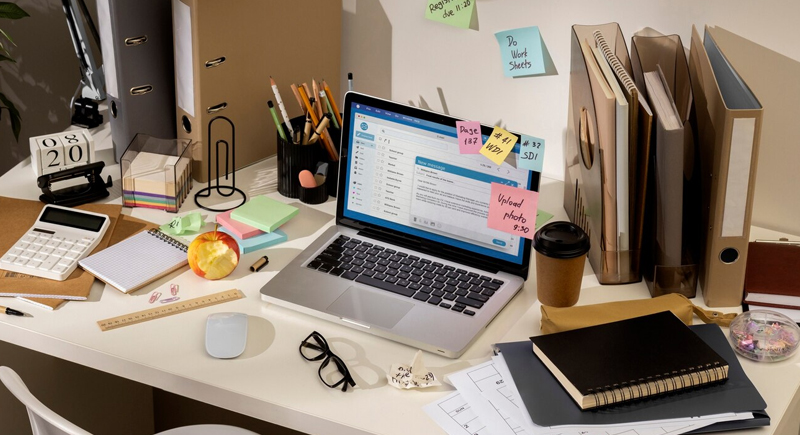31 Allegedly Time-Saving Tips That Actually Waste Your Time
In today’s hustle culture, we’re constantly bombarded with strategies purported to maximize our productivity. However, not all “time-saving” tips live up to their promise. In fact, some can consume more of our time than if we’d stuck with traditional methods. Here’s a rundown of 31 allegedly efficient practices that might be doing more harm than good.
Constant Checking of Emails

Credit: pexels
You might think the constant checking of your email keeps you on top of things, but did you know it can consume up to 28% of your workday? Most of these checks are unnecessary and interrupt the flow of your actual work. Limit your email activity to specific times for better efficiency.
Unnecessary Meetings

Credit: freepik
Ever been trapped in a meeting that could have been an email? Meetings without a clear agenda can lead to hours of wasted time each week. Experts suggest having standing meetings to keep them short and sweet. It’s about time we took a stand—literally!
No Time Boundaries

Credit: pexels
Work tends to swell to fill the time we allocate for it, thanks to Parkinson’s Law. Setting shorter deadlines might sound stressful, but it can increase your productivity dramatically. Chop your workday into dedicated blocks of focus with clear breaks to see just how much you can achieve.
Multi-tasking

Credit: pexels
Trying to do multiple tasks at once might seem efficient, but studies show it can reduce productivity by as much as 40%. Focus on one task at a time to keep your brain from overheating—trust us, your brain will thank you!
Fear

Credit: freepik
While a bit of fear can be motivating, too much can freeze you in your tracks. Facing your fears can actually save you time in the long run. Start by identifying what scares you about your tasks; you might find they aren’t so scary after all.
Indecisiveness

Credit: freepik
Decisiveness saves the day and a lot of time. On average, a delay in decision-making can cost businesses significant amounts annually. Streamline your decision-making process by setting a time limit for each choice. Don’t let your dinner get cold while you’re deciding!
Deciding on Trivial Tasks

Credit: freepik
Did you know decision fatigue can sap your productivity? Automate small decisions to conserve mental energy for the big stuff. Like choosing your outfits the night before—a simple choice that keeps your mornings calm.
Distractions

Credit: freepik
Here’s the thing: Distractions can lead to a loss of 2.1 hours of productivity daily. Set boundaries in your workspace by limiting interruptions. This might mean wearing headphones or setting specific hours for deep work. Sometimes, you have to be selfish with your time.
Inability to Say ‘No’

Credit: freepik
Saying “yes” too often can drain your resources and is linked to people pleasing. Learn to prioritize your tasks and say no to things that don’t align with your goals. It’s not just okay to say no—it’s necessary!
Lacking a System or Action Plan

Credit: freepik
Without a clear plan, you’re just winging it, which can lead to hours of wasted effort. Spend a little time each evening planning your next day. As they say, a minute of planning saves ten in execution!
Disorganization

Credit: freepik
A cluttered space equals a cluttered mind. Studies show that disorganization can lead to increased stress and wasted time. Spend a few minutes each day tidying up, and you’ll find your tasks less daunting.
Doing Something Inefficiently

Credit: freepik
Mastering your craft isn’t just a feel-good slogan; it’s essential for efficiency. Regularly review and tweak your methods to shave off unnecessary time. After all, continuous improvement is the name of the game. Let’s keep getting better, not just busier.
Doing Everything Yourself

Credit: freepik
Ever felt like you’re trying to juggle ten balls at once? Delegating tasks can free up your time, allowing you to focus on areas where you can make a real impact. Remember, it’s okay to pass the baton. Delegation not only improves team morale and efficiency but also fosters enthusiasm, innovation, and cooperation, enhancing overall productivity.
Comparing Yourself to Others

Credit: pexels
Watching someone else’s highlights reel on social media can sap your focus and energy. Concentrate on your own goals; you’re running your own race. It’s been shown that reducing social media comparison can increase personal satisfaction and productivity by up to 25%. Stay in your lane, and you’ll go far.
Trying to Please Everyone

Credit: pexels
You can’t be a hero to everyone; trying to be one can decrease your effectiveness by spreading you too thin. Prioritize tasks and people that align with your objectives. It’s about finding the right balance, not just filling your plate!
Aiming for Perfection

Credit: freepik
Chasing perfection is like chasing shadows—it’s often unattainable and can lead to a 30% increase in time spent on tasks. Strive for progress instead of perfection. This mindset shift can significantly speed up your project timelines. Done is better than perfect.
Touching Things Twice

Credit: pexels
Handling things twice is a notorious time-waster. Implement the ‘do it now’ philosophy with the 2-minute rule: if it can be done in two minutes, do it immediately from start to finish. This keeps your workflow smooth and your mind clear.
False Starts

Credit: freepik
Starting a task without proper preparation can lead to false starts. Take a moment to organize your thoughts and materials before diving in. A solid start sets the pace for success—so start as you mean to go on.
Repeating the Same Tasks

Credit: freepik
Automating repetitive tasks can save you a surprising amount of time. Use tools like automation software to handle routine duties so you can focus on more creative endeavors. Work smarter, not harder—it’s the way of the future.
Repeating the Same Mistake

Credit: pexels
Mistakes are learning opportunities, but repeating the same ones is inefficient. Take time to analyze errors and apply those lessons. Continuous improvement reduces time wasted on future errors.
Continuing to Do Something That Is No Longer Beneficial

Credit: freepik
Holding on to outdated practices can be as detrimental as ignoring new opportunities. Regular reviews of your processes can reveal what’s redundant or outdated. Change can be refreshing and profitable.
Constantly Checking Stats

Credit: freepik
Checking stats too frequently can be like watching paint dry—it doesn’t make it dry any faster. Set specific times for this task to optimize efficiency and reduce anxiety. Your day will thank you for it!
Entertainment

Credit: freepik
Sure, everyone deserves a break, but too much downtime can turn into a major distraction. Balance your leisure time with your work commitments to maintain productivity. Remember, all work and no play makes Jack a dull boy, but too much play makes Jack less employable!
Poor Health Habits

Credit: pexels
Did you know that regular exercise can increase productivity by up to 21%? Staying active and eating well not only keeps you healthy but also sharpens your focus at work. Health is wealth, especially when it comes to managing time effectively.
Neglecting Rest

Credit: freepik
Failing to rest properly can decrease productivity by up to 30%. Regular breaks rejuvenate the mind and body, making you more efficient when you are working. It’s not laziness; it’s smart time management.
Inefficient Learning

Credit: pexels
Investing time in learning how to learn can dramatically cut down on your study hours. Techniques like speed reading and memory aids can be game changers. Make the most of your learning time so you can have more time for everything else.
Implementing New Systems

Credit: pexels
It might take time to adjust to new systems, but the initial effort is often worth the long-term gains. Prepare adequately, set realistic timelines, and be patient with the process. Once you’re up to speed, you’ll wonder how you ever managed the old way.
Holding on to the Past

Credit: pexels
Dwelling on past mistakes can eat up your present time. Learn from what went wrong, apply the lessons, and move forward. The past should inform your future, not consume it.
Lack of Motivation

Credit: pexels
Even the best experience dips in motivation. During these times, lean on structured habits and routines to maintain momentum. Systems work, so you don’t have to rely solely on inspiration.
Not Having a Goal

Credit: freepik
Setting clear goals is crucial; it’s like having a map. Without one, you might wander aimlessly. Define your objectives to streamline your efforts and maximize your time. After all, a goal is a dream with a deadline.
Over-Planning

Credit: freepik
Spending too much time planning can be just as counterproductive as not planning at all. It’s great to be prepared, but over-planning can lead to analysis paralysis, where you’re so bogged down in the details that you never actually start the task at hand. Aim to strike a balance.